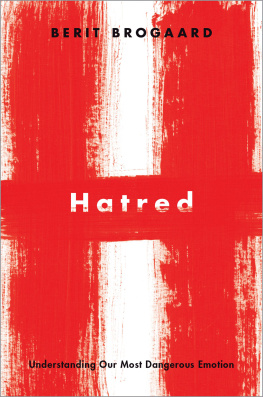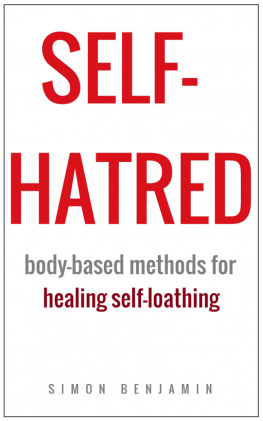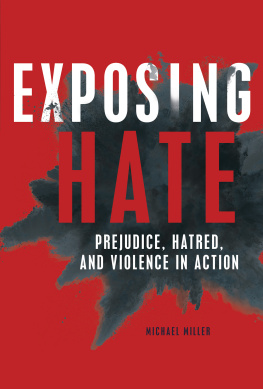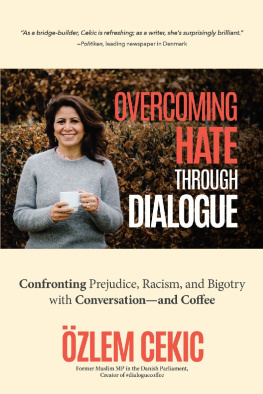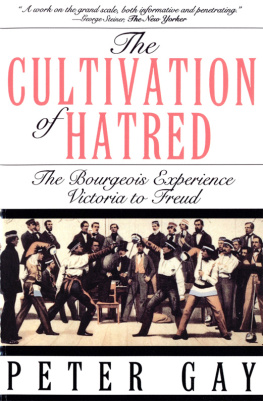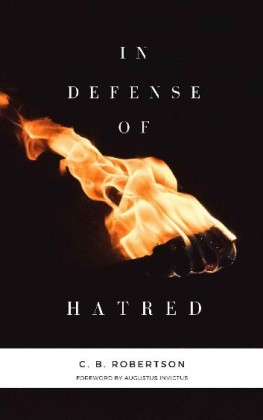HATRED

Oxford University Press is a department of the University of Oxford. It furthers the Universitys objective of excellence in research, scholarship, and education by publishing worldwide. Oxford is a registered trade mark of Oxford University Press in the UK and certain other countries.
Published in the United States of America by Oxford University Press
198 Madison Avenue, New York, NY 10016, United States of America.
Oxford University Press 2020
All rights reserved. No part of this publication may be reproduced, stored in a retrieval system, or transmitted, in any form or by any means, without the prior permission in writing of Oxford University Press, or as expressly permitted by law, by license, or under terms agreed with the appropriate reproduction rights organization. Inquiries concerning reproduction outside the scope of the above should be sent to the Rights Department, Oxford University Press, at the address above.
You must not circulate this work in any other form and you must impose this same condition on any acquirer.
Library of Congress Cataloging-in-Publication Data
Names: Brogaard, Berit, author.
Title: Hatred : understanding our most dangerous emotion / Berit Brogaard.
Description: New York : Oxford University Press, 2020. |
Includes bibliographical references and index.
Identifiers: LCCN 2020006630 (print) | LCCN 2020006631 (ebook) |
ISBN 9780190084448 (hardback) | ISBN 9780190084462 (epub)
Subjects: LCSH: Hate.
Classification: LCC BF575.H3 B76 2020 (print) | LCC BF575.H3 (ebook) |
DDC 152.4dc23
LC record available at https://lccn.loc.gov/2020006630
LC ebook record available at https://lccn.loc.gov/2020006631
For my sweet daughter Rebecca. You are the bravest and most compassionate girl I have ever known. Each day I become increasingly more humbled by your intelligence, your sense of justice and the sheer goodness of your heart. My greatest wish is that the rest of the world one day will become as wise, caring and forgiving as you.
Contents
Over the years many people have contributed in one way or another to the life of this book. For personal enrichment, I am grateful to my lovely and beautiful daughter Rebecca, the rest of my Danish family, and close friends. For emotional support, I am also indebted to my two cats Bertrand Russell and Roderick Chisholm, as well as my dog William James (a.k.a. Nemo). For theoretical input, I am grateful to three anonymous reviewers for Oxford University Press and to Brendan Balcerak Jackson, Magdalena Balcerak Jackson, Sarah Beach, Aaron Ben-Ze'ev, Hanne Brogaard, Niels Brogaard, Rebecca Britney Brogaard Salerno, John Broome, Otvio Bueno, Alex Byrne, Charles Carver, Nick Cherup, Elijah Chudnoff, Nick Cisneros, Andy Cui, Casey Landers, Ingelise Dalberg-Larsen, John Doris, Eduardo Elena, Ed Erwin, Simon Evnine, Daniel Garber, Dimitria E. Gatzia, David Miguel Gray, Danny Guo, Jared Hanson-Park, Kari Hanson-Park, Aleks Hernandez, Risto Hilpinen, Vicky Hu, Brian Leiter, Azenet Lopez, Peter Ludlow, Zoe Ma, Ruth Barcan Marcus, Mike Martin, Curtis Miller, Nick Nicola, Arina Pismenny, Jesse Prinz, Mark Rowlands, Michael Slote, Ken Taylor, Hugh Thomas, Amie Thomasson, Somogy Varga, Melisa Vivanco, and Jack Weinstein; and audiences at Aarhus, British Columbia, Brown, Colorado-Boulder, Copenhagen, Duke, Memphis, Miami, MissouriColumbia, MissouriSt. Louis, Oslo, Southern California, Stanford, Syracuse, TexasAustin, Vermont, and WashU. Special thanks go to my wonderful editor Peter Ohlin for his patience, super-helpful feedback, and critical comments on the manuscript, and copyeditor Wendy Keebler, proof-reader Sylvia Cannizzaro, and senior project manager Rajakumari Ganessin, who all did a fantastic job copyediting, fact-checking, and proof-reading. Finally, I am forever grateful and indebted to my uncle Jrgen Dalberg-Larsen, my Ph.D. supervisor Barry Smith, and my postdoc supervisor David Chalmers for inspiring me to follow in their footsteps as philosophers and for the many hours we have spent talking about philosophical issues. I am a better person and thinker because of them.
My work on this book was made possible by a Center for Humanities Fellowship at the University of Miami, a Cooper Fellowship at the University of Miami, and an Engaged Faculty Fellowship at the University of Miami.
In todays hate-infused society, hate has garnered a bad reputation. The mere mention of this complex emotion often triggers grisly images of psychopathic serial killers, torch-bearing neo-Nazis, mass shooters, or hijacking terrorists. The virulent hatred sown by cable news and social media has caused massive political polarization. But is hatred purely a bad thing, or is it more complex than thateven, sometimes, a good thing? My hope is that this book will help provide a more nuanced picture of this complicated emotion. I argue that it isnt hatred thats the enemy but its lack of justification.
In a 2014 New Yorker interview, Peter Lanza, the father of Adam Lanza, the Newtown, Connecticut, school shooter, said that he wished his son had never been born. He added that he could no longer look at photos of Adam, once it dawned on him that one could not be more evil than his boy. For a father to find the courage to openly express this level of animosity toward a killer, when said killer is his own son, is not only rare but also admirable. Peter Lanzas words are an expression, if not of hate, then at least of an attitude reminiscent of hate.
But if we applaud Peter Lanza for taking this attitude toward his own offspring and expressing sympathy for his sons victims, then hate cannot always be the deeply destructive emotional state that it is often made out to be. This is one of the sentiments I hope to be able to bring to the fore with this book.
Usually, hate isnt a laudable emotional state. Hate that spurs atrocities like genocide, mass shootings, and other violent attacks on innocent minorities is never justified. It rides roughshod over details;
Although group hate could perhaps be justified in theory, in practice it never is. Personal hate, on the other hand, has the precision that group hate lacks. But personal hate that is dehumanizing, coupled with retaliatory wishes, or not serving any worthwhile ends is nonetheless still indefensible. But I argue that no such ugly facet is essential to hate. When kept apart from its mean-spirited siblings, hate can be a gateway to moral vision.
The term hate has a multiplicity of meanings. When asked informally what we mean by hate, we often cite extreme versions of other emotions, such as strong dislike, stomach-churning disgust, dehumanizing contempt, or all-consuming resentment. While our everyday characterizations of hate for the most part lack exactitude, it is true that hate, in one of its senses, is synonymous with strong dislike. I hate fried liver. It has a mushy texture and a bitter iron taste. Its repulsive. Nauseating. Vile. When I say I hate fried liver, I obviously dont intend to convey that I think of fried liver as a malevolent wrongdoer. All I mean is that I have a strong dislike for this old Scandinavian favorite. This is also the sense most of us have in mind when we say that we hate being put on hold, waiting in doctors offices, getting a flat tire, reading work emails, getting by on too little sleep, watching commercials (except during the Super Bowl), coming down with the flu, getting stuck in airports for hours, getting caught in the rain without an umbrella, or being woken up in the middle of the night by a false fire alarm.

